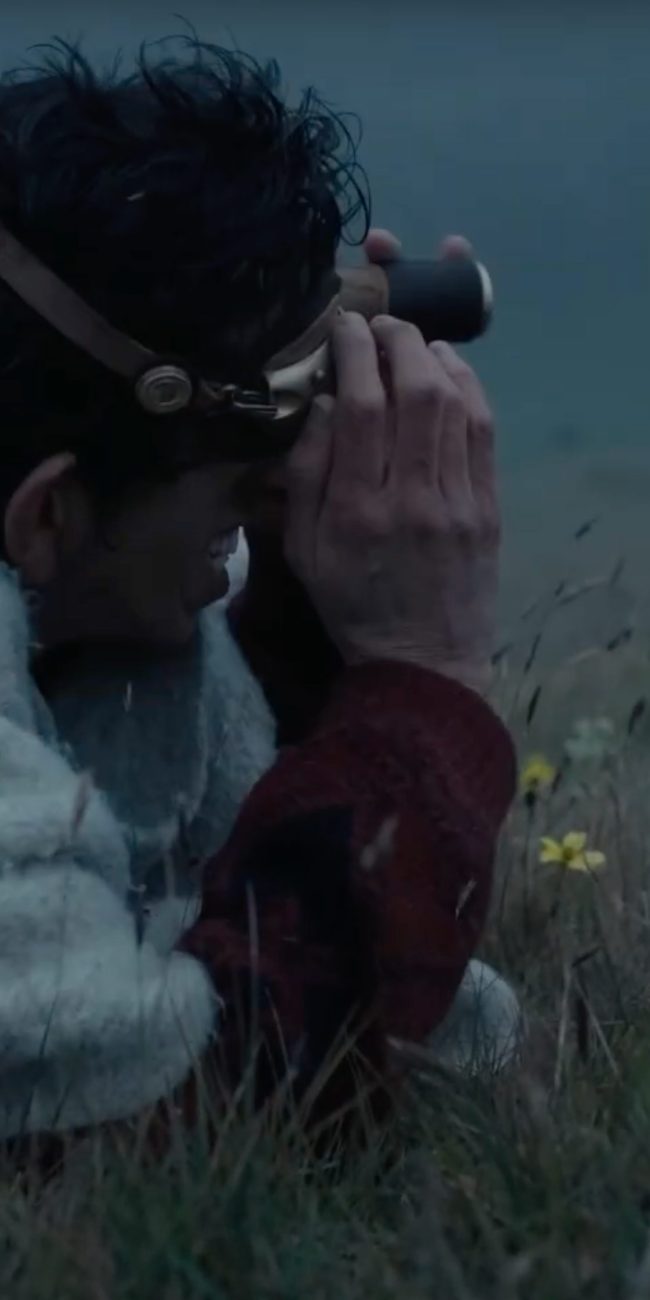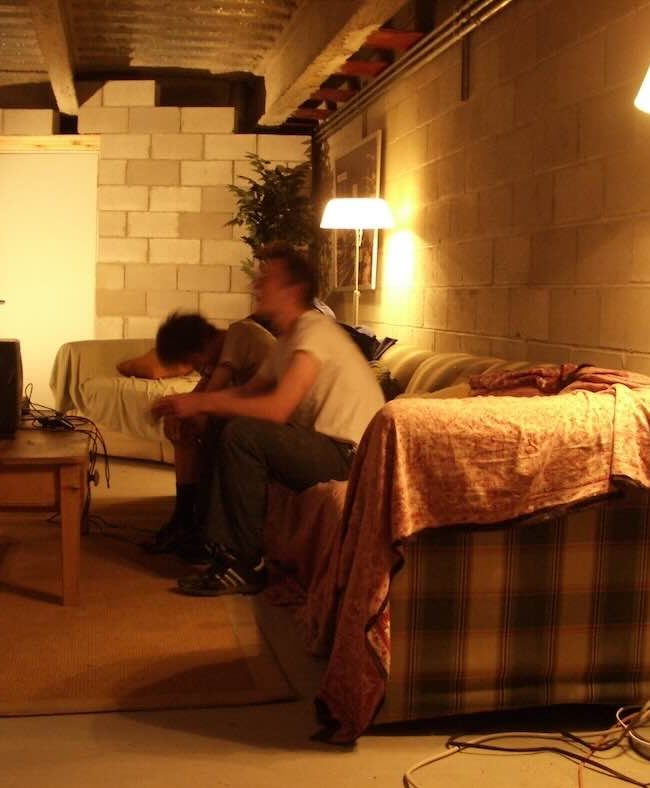A Conversation with Stacy Cochran (WRITE WHEN YOU GET WORK)
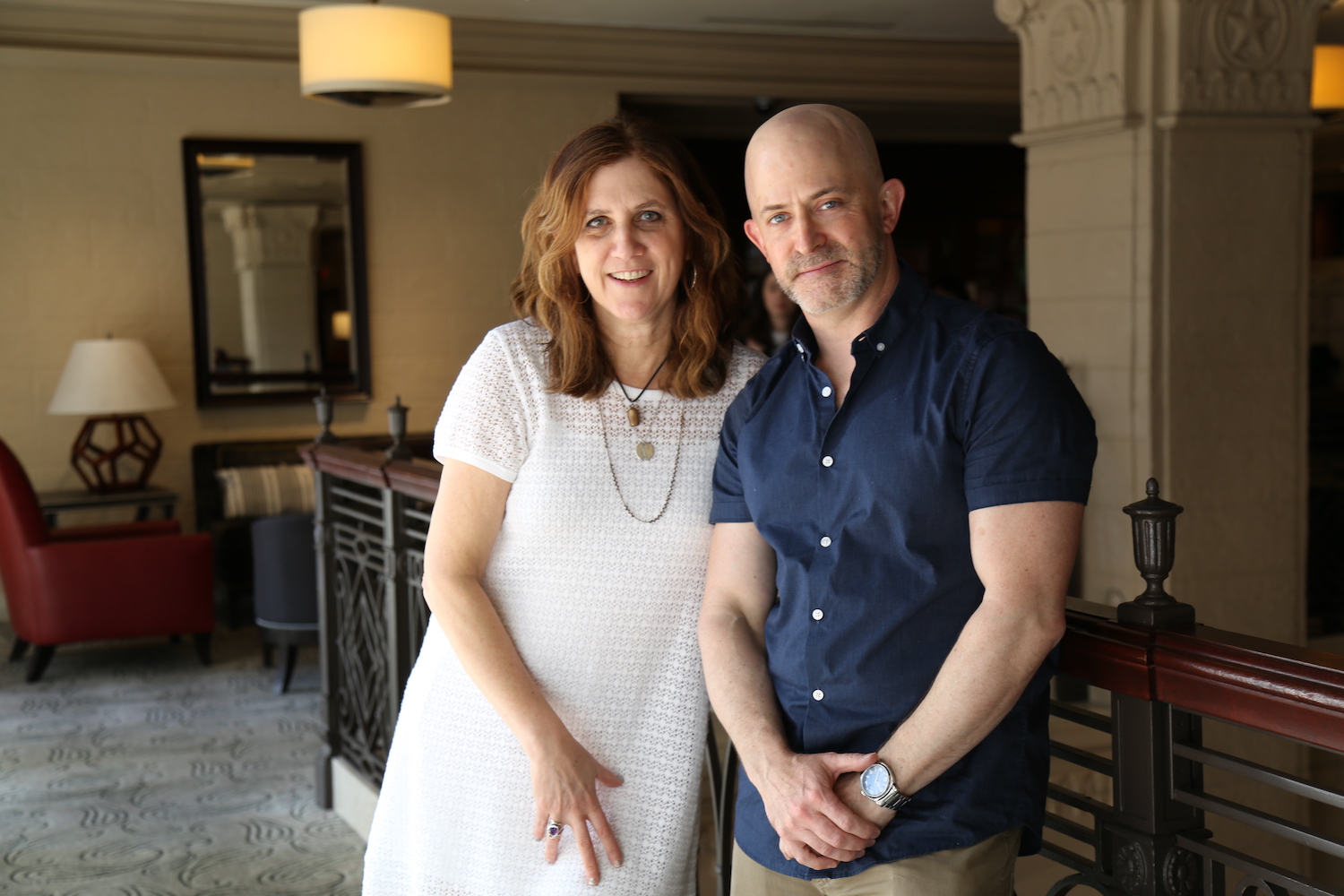
I met with writer/director Stacy Cochran to discuss her new film, Write When You Get Work (which I also reviewed), on Tuesday, March 13, at the 2018 SXSW Film Festival. The movie – her first in 18 years – is a delightful mix of romance and crime thriller, with great performances headlined by Rachel Keller, Finn Wittrock and Emily Mortimer. Set in the competing worlds of working-class Brooklyn and elite Manhattan, the movie offers unpredictable twists and turns that keep us guessing to the very end. With expert mise-en-scène, Cochran takes us on a dizzy, wild cinematic journey that is very much its own reward. Here is a condensed digest of our conversation, edited for clarity.
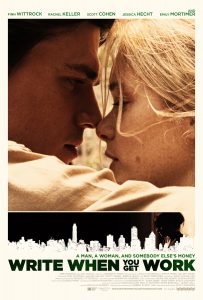 Hammer to Nail: So, one of the things that really appealed to me about this movie is, and I hope you don’t me using this word, the complete oddness of the story…
Hammer to Nail: So, one of the things that really appealed to me about this movie is, and I hope you don’t me using this word, the complete oddness of the story…
(Stacy Cochran laughs)
HtN: I really didn’t know where it was going. It was very fresh and appealing. So, could you discuss the origin of the story? What made you write it? Whence the twists and turns? And what about the title, which I find interesting and not directly related to the plot? I mean, it is, but not really.
Stacy Cochran: So, I’d love to start with title…
HtN: OK!
SC:…because otherwise I’ll repeat myself. The title – “Write When You Get Work” – is kind of an old Depression-era phrase, which implies tough times, but you’re sending someone out into the world and saying, “Go make something of yourself, and get back to us when you do.” Basically, it means, “Write when you get work. Call me when you get a job. Let me know if you start making some money.” So, to me, there’s humor in that…(laughs)…but there’s poignancy, too, because it implies that you may or may not, and if you don’t make something of yourself, don’t bother calling! (laughs) So there’s that piece of it.
The other thing, though, is that it suggests a promise that is fragile. So, to me, in the the lives of Ruth and Jonny, who are the two main characters, Ruth has been given an opportunity to get pushed out into the world. Something happens in the first few frames of the movie that has ongoing implications for their lives and for their love story and for their inability to ever completely let go of each other. So, there is this kind of promise to separate, but to keep an eye and ear out for each other. Does that make sense to you?
HtN: It does! And I like, then, how you tie the title into the story.
SC: Oh, good! Ultimately, I think the movie is about Ruth, in the sense that she is a woman who has been given this opportunity and is trying to protect it and make it worthwhile, because it took a lot of courage and pain to leave behind the events of the first few frames of the movie. And by courage and pain, I don’t mean that it isn’t also sort of a comedy. (laughs) But anyway, we’re talking about what it’s really about, not how you should be watching it.
Whereas Jonny feels completely left behind. And so, questions such as “well, if he could rob somebody, why doesn’t he just rob them and leave?” don’t really apply to the story in a way that makes sense to me. It’s all about circling and circling, in and around different shapes and sizes of circles, around Ruth, and never really being able to get too far away from her, but never being able to get as close as he wanted. So, everything he does is about her. There’s a moment when he says, “It’s not about Ruth,” and of course, that’s the most untrue thing he says in the movie.
HtN: Of course! And the reason why he runs this sort of long con, rather than just robbing people, is because in some way he is trying to prove his worth to her. That he’s better than that.
SC: Yes! That’s very true. And I don’t think he knows what he’s doing. There are a lot of movies where there’s a plan made, at the beginning. In heist movies, there’s a plan. Everybody knows the plan, they get it, they do it, and then it either works or it doesn’t work. Maybe this is what you mean by “odd.” This to me is more real, which is that Jonny is someone who wants a plan, but he doesn’t necessarily know what he wants out of it. Because it’s not really the money.
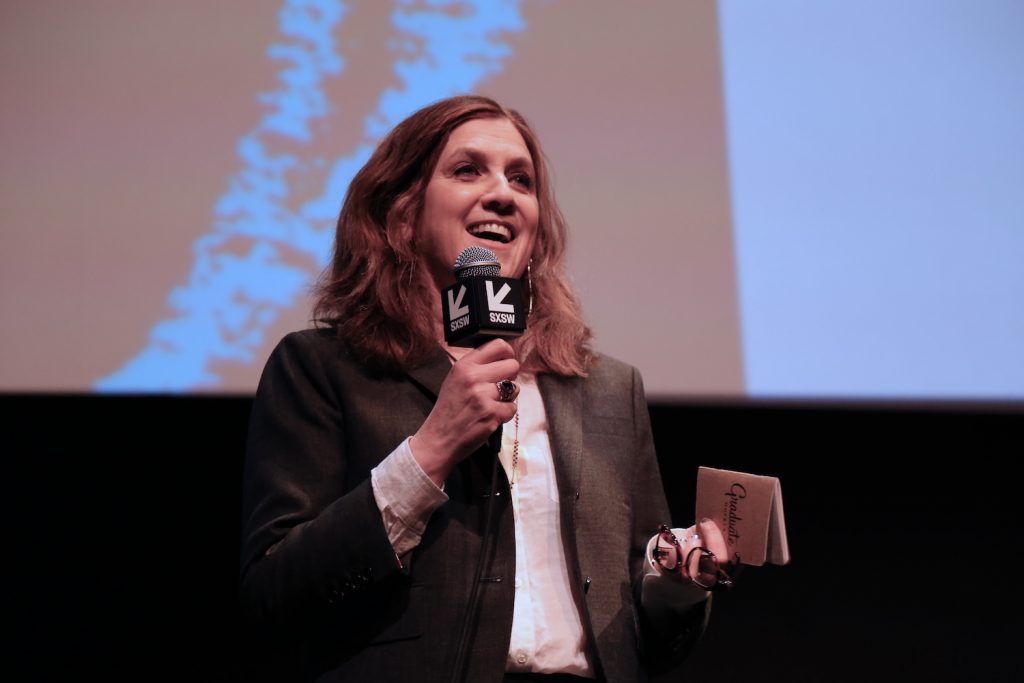
Stacy Cochran at SXSW 2018 Q&A for WRITE WHEN YOU GET WORK
HtN: By “odd,” I really meant unexpected.
SC: And I’m using “odd” in a positive way, too, so maybe I should not use it, either. It’s a good word because…
HtN: It didn’t feel so carefully constructed that I knew what was going to happen. No “here’s the turning point of Act One,” although it is well-structured, in the sense that by the end, it’s satisfying. But it didn’t feel predictable.
SC: Well, I thought it was important that, whatever threads are laid out, that they all come back around and matter, and that all pieces of the story land on their feet, so that it feels like, “Oh, there actually was a plan,” on my part, as a filmmaker. And I think that that’s true. I knew where it was going, but my interest was in making a movie in which I knew exactly where it would all land, but the characters would not. Because that’s what was interesting to me, to watch the characters evolve in what they want, as they realize what they want. So, they may have always wanted it, but they didn’t know they wanted it.
HtN: So, I want to ask you about the cast, but first I want to ask you about your DP [director of photography], because you didn’t hire just anybody…
SC: (laughs) That’s for sure!
HtN: You hired Robert Elswit, who won an Oscar for There Will Be Blood, and has shot many other films by Paul Thomas Anderson – though not the last one – and by many other people, and the film has a really interesting, loose style to it. Like the script, it doesn’t always appear carefully composed. You have a lot of emphasis, particularly early on, on these close-ups where the actors almost go out of frame, because it’s hard to keep people in frame on a long lens, and that is part of that improvisational feel of those early moments. So, how did you decide to hire Robert Elswit, and then how did you come up with that improvisatory shooting style?
SC: Well, first of all, Robert and I have worked together a few times in the past.
HtN: Did he shoot your previous films?
SC: He shot Boys, which is a studio film I made, and then I made a small, experimental documentary…
HtN: Is that the Richard Lester! short doc?

l-r: Emily Mortimer and Stacy Cochran at SXSW 2018 Q&A for WRITE WHEN YOU GET WORK
SC: Yes! He shot that, too! And that was a shooting schedule of one half-day…But we got a lot done in half a day, and he shot that on the Super 8 camera that he used in Boogie Nights…(laughs)…and also some video. That’s the one time I’ve actually used video, because we had a green screen behind Richard Lester that we put the Super 8 images on, so…It was a lot of fun!
HtN: So, you two go way back!
SC: We go way back, and we’ve stayed very close since then, through the ups and downs of some of … you know, all kinds of things…he’s been such a…I mean, I’ve learned so much from him, even in the years I wasn’t shooting. Because if you go out for drinks with Robert, you learn a lot. (laughs)
HtN: Does he go by Robert or Bob?
SC: He goes by Bob, but I still call him Robert. (laughs)
HtN: So was it your decision, or his decision, or a mutual decision, to shoot this movie on film? You shot on 35mm?
SC: Super 16!
HtN: Oh, wow!
SC: So, first of all, I’m going to question the word “hire,” because the thought of “hiring” Robert…still, clearly it’s been a long time since I’ve made a movie, so I was like, “Robert, I’ve got to make a movie.” I’d been writing a lot, and had a script, done some teaching, gotten involved in some museums, and…I had three daughters. I never stopped wanting to direct. This is what I thought I was supposed to be doing, but I just couldn’t figure out to get a movie made, not only with the constraints of the business, but with everything else going on in my life.
HtN: How old are your daughters now?
SC: They’re…old. (laughs) One’s in high school, one’s in college and one’s in grad school.
HtN: So, it’s a good time to let them leave the nest.
SC: Yeah. Although, honestly, even making a movie now, I’ve thought, “Oh my God! It’s a fully encompassing thing for the year you spend on it.
HtN: Of course!
SC: That’s an understatement! And I just don’t know how I could have done it even two years ago, when I think about what it’s taken out of me. It’s still a juggle! I mean, I know that’s true for everyone. You don’t have to be a mom to feel that way. But it was a great time to do other things and think and get ready. The issue is, do you get the opportunity? I’ve done all the things I felt I had to do, I’ve made a bunch of movies, I’m ready to start again, and then the question is, is anyone going to give you the opportunity to do that? And, if someone does give you the opportunity, is anyone like SXSW going to give it some attention? So, the fact that the answer is yes to both those things is pretty awesome.
HtN: It is! So, back to the choice of how you chose to shoot the film…
SC: Right! Robert! So, I did a Kodak panel the other day, which was really fun, because I’ve really always shot on film, and it was really such a simple decision, like most things, with Robert, which is why I even question the word “hire,” because it just feels so natural. So, he said to me, “I just shot this thing on Super 16. Want to see it?” And he just showed me something absolutely gorgeous, on his phone. And I was like, “Let’s do that!” And he was like, “Yeah! Let’s do that!” And that was the length of the conversation! (laughs)
HtN: And of course, being Robert Elswit, he can be trusted to make it look great on film.
SC: That’s an important thing you just said! Because there are so many ways that this was only possible because there was such extraordinary trust that not only would it all be what we needed it to be, and that the movement, or the ways in which it was fluid, would be effective, but also that he always understood everything that I was looking for.
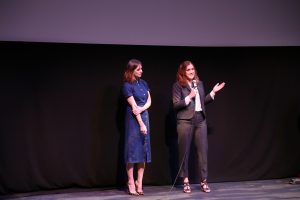
l-r: Emily Mortimer and Stacy Cochran at SXSW 2018 Q&A for WRITE WHEN YOU GET WORK
HtN: Sure! That is important! And speaking of trust, I now want to ask about the cast. As much as Emily Mortimer is your big star, and as much as I like her, I am actually especially impressed with your two young leads.
SC: Oh, I’m so glad!
HtN: Yes, your Ruth and Jonny! I know I’ve seen Rachel Keller before, in the second season of Fargo, and I guess I saw Finn Wittrock in Unbroken – I looked up his credits – but I’m not sure I remember him in that. I was also really happy to see Tess Frazer. I kept saying to myself, “Where do I know her from?” And then I looked her up, and, of course, she was in Netflix’s Godless!
SC: Yes!
HtN: And you also have Scott Cohen. But really, how did you cast your two leads, as well as Emily, all of whom I like a lot?
SC: I am so glad to hear that! Well, in a lot of ways…first of all, Rachel is also in Legion, which is where a lot of people know her from…
HtN: Which I haven’t seen.
SC: Finn, I had seen…actually, the film I really saw him in for the first time was The Big Short.
HtN: That’s right!
SC: I just loved that movie, and I loved him in it, even though it’s a small part. So, in some ways, it was just traditional casting. I work with Todd Thaler, who’s a casting director I’ve known since My New Gun, which I shot out of film school. And we have a very easy sense of each other – kind of like what I have with Robert – and what we’re looking for, and he really understands my characters and the things I write. And so we asked them to read the script, and they both liked it, and it just seemed perfect.
HtN: They have great chemistry together. They really do.
SC: I’m so glad!
HtN: So, did you then go through your casting director to find Emily, as well?
SC: She came in first. That was the first idea, even though Nan doesn’t seem like the lead, that was a crucial role, because, as we do with all the characters, we have to feel an empathy and an excitement about them, like them or not. I don’t live in a very zero-sum world, where one person’s gain is another person’s loss, and so I wanted to make a movie about that, in which everybody is on the make, everybody is up to some version of no good, but by the time it’s over, they’re all in a slightly better place. (laughs) That’s tricky! And a lot of that is casting. I always try to cast actors who have a sense of humor, and who you’re rooting for, no matter how much they’re driving you crazy,
HtN: Yeah, and Jonny does drive you crazy.
SC: Oh, good!
HtN: And as much as I feel that the people on whom he runs the con kind of deserve it, it’s still a con.
SC: It is!
HtN: And so, you have to ask people to empathize with and identify with someone who is doing something wrong. He’s also threatening Ruth’s livelihood, so…
SC: Yes! And that, if you like Ruth – and Rachel’s performance – then you have a stake in her being able to hold her ground. And he’s, like, chipping away at it! Stop it!
HtN: I mean, he’s an abusive male, in some ways…
SC: In some ways…but, in the end, she actually has quite an incredible victory, in my mind, which is not only to ultimately stand her ground, and have her career and her life continue, but she helps him to realize what he really should be doing and thinking about. It’s not just that he evolves, though, but also that she becomes generous enough to let him do that. And then, she’s a little bad, too, so…(laughs)
HtN: Like with the Audi, at the end.
SC: Yeah, without giving too much away…but you don’t take what you don’t need, and sometimes you need things that you’re not really entitled to, but, well…
HtN: Like, perhaps, the sunglasses…
SC: Yeah, exactly! And she gets the bracelet. Doesn’t want to give that back! (laughs)
HtN: Well, congratulations on the film!
SC: Thank you so much!
– Christopher Llewellyn Reed (@ChrisReedFilm)








